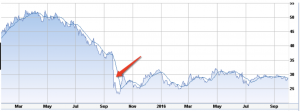It is insufficient for a business to achieve sustainable growth over the long term if it solely focuses on increasing shareholder value. In fact, it is imperative for businesses to be socially responsible by following an appropriate code of ethics. If ignored, a business may enjoy short-term gains but will eventually enter a decline phase. If followed correctly, a business is more likely to achieve sustainable prosperity.
A prime example of a company who disregarded business ethics is Volkswagen. September 2015 was a nightmare for the European based auto giant, as news spread around the world “that 11 million of its diesel cars were equipped with software that could be used to cheat on emissions tests” (Ewing, 2015). Volkswagen’s dishonesty shows how the company missed their business ethics class and lost everyone’s trust. As a result, VLKAY fell 30% overnight and over 40% on the NYSE since May 2015.

So why would such an established company like Volkswagen break the law? Some would suggest it’s because the United States Environmental Protection Agency (EPA) tightened their emission standards back in 2004. However, there is a greater issue here: pressure from senior management often leads to employees taking shortcuts. In this case, the engineering employees at Volkswagen were given unrealistic time and budget constraints from senior management, thus creating enormous pressure on lower level managers. In today’s world, there is such an enormous focus on maintaining and growing one’s stock price, that unattainable goals are frequently set in hopes of succeeding as soon as possible. These unrealistic goals are one of the core issues that motivated the engineers to consciously break the law. Had Volkswagen taken a more prudent approach with more realistic budgets and deadlines, the engineers would have been able to achieve the EPA standards without breaking the law.
What many don’t realize is that a solution to the emissions problem was found a few years later, but Volkswagen got greedy and continued to lie about their emissions not once, but 11 million times. Without a culture of proper business ethics that permeate the organization, a large group of employees accepted unethical behavior without raising any alarm bells. This also points to a need for a whistleblowing process, which in this case was absent. Ideally, the process should allow any employee who notices criminal behavior to raise concerns with an appropriate authority without fear of reprisal.
Business ethics are directly correlated with the image a company enjoys; it can either make, or break you. Proper business ethics lead to good choices which equate to sustainable growth and prosperity. Without ethics, greed and dishonesty can take over one’s identity in the long run, as we have seen at Volkswagen.
Word Count – 448
Sources:
Stash, . (2016, October 6). VW Scandal: How Has It Impacted Volkswagen’s Stock? (VLKAY). In Investopedia . Retrieved from http://www.investopedia.com/news/vw-scandal-how-has-it-impacted-volkswagens-stock-vlkay/
Goodman, L. M. (2015, December 15). Why Volkswagen Cheated . In Newsweek. Retrieved from http://www.newsweek.com/2015/12/25/why-volkswagen-cheated-404891.html
Ewing, J. (2015, September 22). Volkswagen Says 11 Million Cars Worldwide Are Affected in Diesel Deception. In The New York Times. Retrieved from https://www.nytimes.com/2015/09/23/business/international/volkswagen-diesel-car-scandal.html
Photo:
(2015). Investopedia . Retrieved from http://www.investopedia.com/news/vw-scandal-how-has-it-impacted-volkswagens-stock-vlkay/